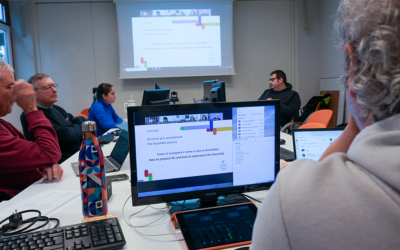September 1, 2013: Pope Francis’ heartfelt plea for peace in the Middle East.
 August 30 – 31: Meeting with 500 adults and young people, laity and priests, religious and bishops, representing the Focolare Movement in this area of the world. They came from Greece, Algeria, Morocco, Syria, Iraq. Persian Gulf countries and the Arab Emirates. These are difficult times for these lands, and many had to overcome impossible obstacles to join Maria Voce and Giancarlo Faletti on their visit.
August 30 – 31: Meeting with 500 adults and young people, laity and priests, religious and bishops, representing the Focolare Movement in this area of the world. They came from Greece, Algeria, Morocco, Syria, Iraq. Persian Gulf countries and the Arab Emirates. These are difficult times for these lands, and many had to overcome impossible obstacles to join Maria Voce and Giancarlo Faletti on their visit.
A letter from Syria was welcomed by thunderous applause: “You know that we are going through a difficult time (. . .) in the midst of the pain we carry on building bridges of love and unity with others (. . .) we sow hope in the people who are suffering all around us, we fill their sorrowful hearts with the presence of God, we do everything possible to bring love to others. (. . .) Today we pray with you today for Peace, which is being so threatened in the world and in the Middle East, especially Syria, Egypt, Lebanon and Iraq – that God’s love may triumph everywhere in the world.”
There were Christians from a variety of Churches (Catholics, Coptic Orthodox, Greek Orthodox and Greek Catholics, Maronites, Armenians, Chaldeans, Syro-Orthodox and Syro-Catholics), and also a substantial representation of Muslims from Algeria, but also Morocco, Turkey and Jordan. A cross section that makes you think that unity is not a dream, as Maria Voce remarked: “Looking at you, how could one have doubts about a united world!” For two days there was an atmosphere of true brotherhood.
Chiara Lubich had visited Amman in November 1999, but already in 1969 had said that “there are hotbeds of war everywhere in the Middle East, such that peace is always in danger. What should we do, since our ideal is unity? We should help these brothers and sisters to love one another, this body must heal. The health of humanity must be brought to bear here.”
 The experiences from different countries underscored how the steps taken by the Focolare have been aimed towards this goal: to bring dialogue as a pathway to peace. Algeria and Turkey began by sharing how the dialogue developed with Muslims, and the ecumenical dialogue with Orthodox Christians. It wasn’t an easy process. Quite the contrary! Everyone involved in this experience has no hesitation to mention the criticisms, but also the firm decision to bring the experience ahead. Ever since February 2012, when she visited Tlemcen, Maria Voce gratefully confirmed the presence of Muslims in the Focolare in Algeria.
The experiences from different countries underscored how the steps taken by the Focolare have been aimed towards this goal: to bring dialogue as a pathway to peace. Algeria and Turkey began by sharing how the dialogue developed with Muslims, and the ecumenical dialogue with Orthodox Christians. It wasn’t an easy process. Quite the contrary! Everyone involved in this experience has no hesitation to mention the criticisms, but also the firm decision to bring the experience ahead. Ever since February 2012, when she visited Tlemcen, Maria Voce gratefully confirmed the presence of Muslims in the Focolare in Algeria.
No less prophetic were the small but great stories of how the Movement began in Turkey, Greece, Cyprus, Lebanon, the Holy Land, Jordan, Syria, Iraq and Egypt. These are lands that have all at one time or another been torn by war, where, in spite of the difficulties, this spirit has found development often through social assistance projects that have brought healing to deep and painful wounds. As the Nuncio to Jordan and Iraq, Archbishop Giorgio Lingua pointed out, dialogue is a risk, but it also builds relationships of mutual trust that are cemented over time. Muslim professor, Amer Al Hafi, vice-director of the prestigious Royal Institute for Inter-faith Study of Amman, affirmed: “Dialogue is a grace from God for us. Through dialogue I understand the greatness of God who allows us to savor the diversity.”
 During the discussion with Maria Voce and Giancarlo Faletti some problems were mentioned that are currently being faced by this region of the world . . . problems that affect everyone, daily difficulties and death, problems for families and their future. Some barriers also emerged that exist among countries in the region, as well as the relationship between Muslims and Christians and the role of Muslims within the Focolare.
During the discussion with Maria Voce and Giancarlo Faletti some problems were mentioned that are currently being faced by this region of the world . . . problems that affect everyone, daily difficulties and death, problems for families and their future. Some barriers also emerged that exist among countries in the region, as well as the relationship between Muslims and Christians and the role of Muslims within the Focolare.
Maria Voce concluded by inviting everyone to a moment of silence, asking for the gift of peace: “Placing ourselves in front of God so as to place ourselves at his service, asking him to use us as instruments of peace (. . .) in these lands.”
Compiled by Roberto Catalano
Photo: Claude Gamble




0 Comments